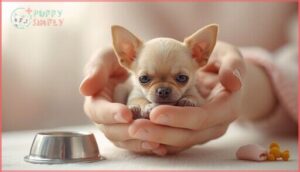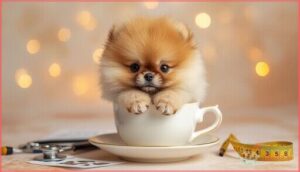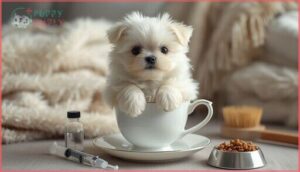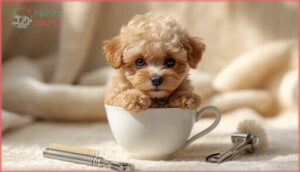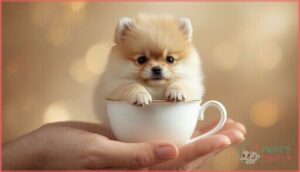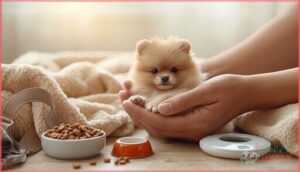This site is supported by our readers. We may earn a commission, at no cost to you, if you purchase through links.
That impossibly tiny puppy perched in a designer handbag might look like the perfect companion, but here’s what most people don’t realize: teacup dogs aren’t actually a distinct breed—they’re the smallest runts from toy breed litters, deliberately bred to stay pocket-sized.
While these pint-sized pups weighing under five pounds have captured hearts worldwide, they come with serious health challenges that every potential owner needs to understand. From life-threatening hypoglycemia to fragile bones that can break from a simple jump off the couch, these miniature companions demand specialized care that goes far beyond what typical dogs need.
If you’re drawn to the best teacup dog breeds like Chihuahuas, Pomeranians, or Yorkies, you deserve the full picture—both the undeniable charm and the very real responsibilities that come with caring for these delicate little souls.
Table Of Contents
- Key Takeaways
- What Are Teacup Dog Breeds?
- Most Popular Teacup Dog Breeds
- Key Characteristics of Teacup Dogs
- Health Risks in Teacup Dog Breeds
- Essential Care Tips for Teacup Dogs
- Frequently Asked Questions (FAQs)
- Which teacup dog is the best?
- What teacup dog lives the longest?
- What is the friendliest tiny dog?
- How much do teacup dogs cost?
- What is a teacup puppy?
- Are teacup dogs small dogs?
- Are teacup dogs healthy?
- What dog breeds come in teacup sizes?
- What is the smallest teacup dog?
- Are teacup Fox Terriers good dogs?
- Conclusion
Key Takeaways
- Teacup dogs aren’t a recognized breed—they’re deliberately bred runts weighing under 5 pounds who face serious health risks like hypoglycemia, bone fractures, and hereditary disorders that standard toy breeds rarely encounter.
- These ultra-miniature companions require specialized care including multiple daily meals to prevent blood sugar crashes, rigorous safety measures to avoid bone injuries, and significantly higher veterinary costs ($480-$2,400 in year one alone).
- Popular teacup varieties like Chihuahuas, Pomeranians, and Yorkies are bred below official breed standards, with no major kennel club recognizing “teacup” as anything beyond a marketing term that often masks unethical breeding practices.
- While teacup dogs offer intense companionship and suit apartment living, potential owners must commit to constant vigilance, emergency funds, and accepting that their pet’s charm comes with genuine fragility and shortened lifespans compared to healthier-sized dogs.
What Are Teacup Dog Breeds?
You’ve probably seen those impossibly tiny puppies nestled in teacups or designer handbags and wondered what makes them so small. Teacup dogs aren’t a separate breed—they’re miniaturized versions of already-small toy breeds, bred to weigh less than five pounds as adults.
Let’s break down what defines these pint-sized pups, how they differ from their standard toy cousins, and what traits they usually share.
Definition and Size Criteria
Teacup dog” isn’t an official breed classification—it’s a marketing term for ultra-small pups that fall well below standard toy dog breeds. Major kennel clubs like the AKC don’t recognize teacup as a formal size category, leaving weight limits and body proportions loosely defined.
Here’s what you’ll generally see:
- Adult weight: Usually 2–5 pounds, sometimes as little as 1 pound
- Height: About 5–10 inches at the shoulder
- Body length: No more than 17 inches overall
- Breeds affected: Chihuahuas, Pomeranians, Maltese, Yorkies, and Poodles
This miniaturization effect creates dogs considerably smaller than breed standards—and that tiny size comes with real health trade-offs. Understanding the teacup dog ethics is essential for potential owners.
Differences From Toy Breeds
You might think toy and teacup are interchangeable, but they’re not. Toy dog breeds like Pomeranians (3–7 pounds) and Yorkies (up to 8 pounds) meet formal AKC standards. Teacup dogs fall below those ranges—often under 5 pounds—and aren’t recognized by major kennel clubs.
That size comparison matters because breeding for extreme smallness increases genetic differences and health implications, requiring more intensive teacup dog care than standard toy breeds need. Understanding the risks of unethical breeding practices is essential for potential owners.
Common Teacup Dog Traits
Beyond their pocket-sized frames, you’ll notice these pint-sized companions share surprising similarities. Teacup dog behavior leans bold and confident—they don’t realize they’re tiny. Small breed genetics shape both charm and fragility, influencing canine socialization needs and tiny dog training challenges. Miniature nutrition demands careful planning due to fast metabolisms.
Common teacup dog breed characteristics include:
- High energy bursts suited for indoor play sessions
- Strong attachment to owners, preferring constant companionship
- Alert nature that makes them excellent mini watchdogs
- Playful temperament persisting well into adulthood
Most Popular Teacup Dog Breeds
If you’re drawn to the idea of a pocket-sized companion, you’ll want to know which breeds show up most often in teacup form. These aren’t separate breeds—they’re the tiniest versions of already-small toy dogs, bred down to fit in your palm.
Let’s look at the five you’ll encounter most, along with what makes each one unique and what you need to know before falling in love.
Teacup Chihuahua
When you hold one of these pint-sized pups, you’re cradling just 2 to 4 pounds of personality—often standing only 6 inches tall. Teacup Chihuahuas face serious health concerns in teacup dogs like hypoglycemia and tracheal collapse, making small dog care and training essential.
Their teacup genetics demand ultra small care, including frequent meals and gentle handling. Chihuahua training and puppy socialization help these teacup dog breeds thrive despite small dog safety challenges.
Teacup Pomeranian
Fluffy bundles of energy, these teacup Pomeranians weigh 3 to 7 pounds and stand 8 to 11 inches tall—occupying the smallest end of breed preservation standards. Pomeranian genetics mean puppies born at just 2 to 5 ounces remain vulnerable, making small dog care and training essential. Reputable breeders avoid producing dogs under 3 pounds because:
- Hypoglycemia risk skyrockets with extreme miniaturization
- Teacup dog pricing reflects demand, not welfare
- Puppy socialization protects these fragile companions from injury
Teacup Yorkshire Terrier
Weighing under 4 pounds at maturity, teacup Yorkshire Terriers represent just 9 percent of the breed—most Yorkies hover between 4 and 7 pounds. That’s why teacup training and Yorkie socialization matter so much: bone fragility and hypoglycemia plague these toy breeds disproportionately.
Puppy development hinges on careful monitoring during the first year, when growth abnormalities and respiratory compromise become most apparent in small dog breeds.
Teacup Maltese
Standard Maltese weigh 4 to 7 pounds, so teacup Maltese marketed under 4 pounds push the absolute lower limit—triggering teacup health issues like hypoglycemia episodes that demand urgent care.
You’ll need multiple small meals daily to stabilize blood glucose, plus careful teacup Maltese grooming to prevent matting.
Maltese training tips and early Maltese socialization help, but remember: no kennel club recognizes “teacup” as anything more than a marketing tag.
Teacup Poodle
Toy Poodles stand around 10 inches at the shoulder, but teacup Poodle genetics push them even smaller—raising fracture risk, hypoglycemia, and anesthetic complications that standard toy dogs rarely face.
- Teacup training demands patience with their delicate frame
- Miniature grooming prevents matting in curly coats
- Poodle socialization builds confidence despite tiny size
- Toy nutrition schedules stabilize blood sugar daily
No kennel club lists “teacup” as official, only marketing hype.
Key Characteristics of Teacup Dogs
Teacup dogs pack enormous personality into pint-sized packages, but their tiny frames come with some serious trade-offs you need to know about. From their fearless attitudes to their delicate bones, these miniature companions don’t behave—or live—quite like their standard-sized cousins.
Let’s break down what makes teacup dogs tick, so you can decide if one of these pocket rockets is right for your home.
Personality and Temperament
Don’t let their pocket size fool you—teacup dog breeds pack outsized personalities into tiny frames. These canine companions form intensely close social bonds with their owners, often following you room to room and seeking constant contact.
However, their emotional intelligence comes with a catch: smaller breeds show higher fear factors and attachment styles that can spiral into separation anxiety.
While trainability traits vary, consistent training helps channel their bold, sometimes reactive temperament into confident dog behavior.
Physical Appearance
Teacup dog breeds share a signature look: bodies proportions that fit into your palm, standing six to nine inches tall and weighing two to four pounds. Head shapes range from rounded “baby-faced” profiles to shortened muzzles, with coat types and color patterns mirroring their standard-sized relatives.
Your Teacup Pomeranian sports a fluffy double coat, while your Teacup Yorkie shows off floor-length silky hair. Teacup Chihuahua and Teacup Maltese display fine limb structure and delicate bone frames.
Suitability for Apartment Living
Their tiny frames suit compact spaces perfectly—your teacup breeds thrive in apartments under 550 square feet. Space requirements stay minimal with 10–15 minute indoor play sessions. Watch noise levels though: Chihuahuas bark more than Maltese or Poodles.
Housetraining tips stress frequent outdoor trips (every 2–3 hours for puppies), while social adaptation demands early exposure to hallway traffic.
Indoor safety means gating balconies and removing high furniture—these lap dogs break bones easily.
Health Risks in Teacup Dog Breeds
Here’s the truth that doesn’t always make it into the glossy puppy photos: teacup dogs face serious health challenges that standard-sized toy breeds simply don’t encounter as often. Their ultra-miniature bodies create a perfect storm of medical vulnerabilities, from life-threatening blood sugar crashes to bones that break far too easily.
Let’s walk through the most critical health risks you need to understand before bringing one of these tiny dogs home.
Hypoglycemia and Common Issues
Low blood sugar stands as the most serious threat facing these pocket-sized companions. Hypoglycemia causes devastating symptoms in teacup dog breeds—weakness, tremors, even seizures—because their tiny bodies can’t store enough glucose.
Your Teacup Chihuahua needs four to six small meals daily to maintain stable blood sugar. Miss one feeding? Emergency care may become necessary. Health monitoring isn’t optional; it’s survival.
Diet management means choosing energy-dense puppy formulas that pack maximum calories into every bite.
Bone Fragility and Injuries
Beyond hypoglycemia, fragile bones pose relentless danger in teacup dog breeds. One jump off your sofa can snap a radius or ulna—forelimb fractures account for nearly half of all long-bone breaks in toy breeds. Injury risk skyrockets because their delicate skeletons can’t absorb everyday impacts.
Fracture prevention means rethinking your home:
- Install pet ramps beside furniture
- Supervise all floor play
- Schedule regular orthopedic care
- Avoid rough handling or drops
Bone health depends on vigilance, not luck.
Lifespan and Hereditary Disorders
Skeletal fragility is just the surface. Chronic illness runs deeper in teacup dog breeds—median lifespans hover near 9 to 15 years, often cut short by hereditary disorders standard-sized dogs rarely face. Genetic testing and health screening reveal brutal truths about congenital issues.
| Disorder | Signs | Breed-Specific Risk |
|---|---|---|
| Heart valve disease | Coughing, exercise intolerance | Maltese, Pomeranians |
| Hydrocephalus | Seizures, vision loss | Chihuahuas, toy lines |
| Liver shunts | Poor growth, neurologic signs | Yorkies, undersized pups |
| Tracheal collapse | Honking cough, fainting | Poodles, Chihuahuas |
| Patellar luxation | Limping, arthritis | All teacup varieties |
Mortality rates climb when breeders pair runts repeatedly, concentrating genetic disorders instead of diluting them. You’re not rescuing a tiny soul—you’re inheriting a medical file.
Breeding runts for teacup size concentrates genetic disorders—you’re not adopting a pet, you’re inheriting a medical file
Essential Care Tips for Teacup Dogs
Caring for a teacup dog isn’t like caring for your average pup—these pint-sized companions need specialized attention to stay healthy and safe. From what goes in their bowl to how you pick them up, every detail matters when you’re working with such fragile little bodies.
Here’s what you need to know to give your teacup dog the best care possible.
Specialized Nutrition and Feeding
Feeding your teacup dog isn’t like filling any old bowl—it’s precision work. These tiny breeds need about 200 kilocalories daily as adults, but puppies demand three to five meals spaced through the day to dodge hypoglycemia.
Choose calorie-dense kibble designed for small mouths, watch portion sizes like a hawk, and consider high-calorie supplements if your pup’s energy dips. Nutrient balance and meal frequency aren’t optional—they’re lifelines.
Grooming and Hygiene Needs
Your teacup dog’s grooming and hygiene demands daily attention. Brush that silky coat three to four times weekly to prevent matting, bathe every four to six weeks, and tackle dental care daily since extra-small breeds face five times the periodontal risk.
Don’t skip ear cleaning, nail trimming every eight to twelve weeks, and tear-stain removal around those expressive eyes—neglect invites infection fast.
Safety and Handling Precautions
One slip off your sofa can shatter a teacup’s fragile bones—these pint-sized companions need baby gates on stairs, soft landing zones, and constant vigilance underfoot. Support their entire body when lifting, never by the collar or legs.
Puppy-proof like your life depends on it: secure loose cords, remove choking hazards, and supervise every interaction with children to prevent accidental injury.
Veterinary Care and Expenses
Veterinary costs for teacup dogs can eclipse those of larger breeds—think $480 to $2,400 in year one alone, then $500-plus annually for wellness checks that catch hypoglycemia, dental disease, and heart defects early. Budget smartly with these essentials:
- Core vaccines and exams: $200–$400 first year
- Emergency funds: $1,000–$2,000 reserve
- Pet Insurance: $12–$50 monthly
- Chronic Care visits: biannual checkups
- Specialty Services for anesthesia safety
Frequently Asked Questions (FAQs)
Which teacup dog is the best?
About 30% of teacup dogs require emergency vet care in their first year.
There’s no single “best” breed—your lifestyle, experience with small dog training, and commitment to intensive care determine which teacup breed suits you.
What teacup dog lives the longest?
Among teacup dog breeds, Chihuahuas tend to live longest—sometimes reaching fourteen to fifteen years—thanks to their naturally hardy baseline.
However, they still face health outcomes and size impact risks that reduce longevity compared to standard toy breeds.
What is the friendliest tiny dog?
Like magnets drawn to warmth, Teacup Maltese and Teacup Poodles lead the pack in Friendly Breed Traits among Tiny Dogs. Their gentle, people-focused nature makes them outstanding Companion Dogs, thriving on human connection and miniature canine companionship through consistent Small Dog Socialization.
How much do teacup dogs cost?
Purchase prices for teacup dog breeds generally range from $500 to $3,000, though rare teacup varieties can reach $10, Ownership expenses—including veterinary costs, grooming, and insurance—add thousands more annually.
What is a teacup puppy?
A teacup puppy is a tiny dog bred to weigh under 4 to 6 pounds at maturity—much smaller than standard toy breeds.
These ultra-miniature companions are produced through selective breeding practices that prioritize diminutive size.
Are teacup dogs small dogs?
Yes, teacup dog breeds fall under the small canines category, but they’re notably tinier than typical toy breeds. Most standard small dogs weigh 7–14 pounds, while teacup dogs barely tip the scale at under 5 pounds.
Are teacup dogs healthy?
No, teacup dogs aren’t healthy. Veterinary organizations report they face substantially higher health risks than standard-sized dogs—including hypoglycemia, bone fragility, heart defects, respiratory issues, and shortened lifespans—due to extreme breeding practices that concentrate genetic disorders.
What dog breeds come in teacup sizes?
You’ll find several toy breed varieties marketed in teacup sizes, including Pomeranians, Chihuahuas, Yorkshire Terriers, Maltese, and Toy Poodles—all bred intentionally smaller than their already-tiny standard counterparts, usually under four pounds.
What is the smallest teacup dog?
The Teacup Chihuahua takes the title as the smallest teacup dog, usually weighing just 2–4 pounds at maturity and standing around 5–6 inches tall—tinier than other miniature breeds.
Are teacup Fox Terriers good dogs?
Fox Terrier Temperament shines in standard miniatures weighing 7–12 pounds—too sturdy for teacup dog breeds categorization.
These small dog breeds thrive with daily exercise, minimal grooming, and strong bonds, but miniature Fox care avoids extreme size risks.
Conclusion
Adopting one of the best teacup dog breeds is like bringing home a porcelain treasure—breathtaking but breakable. You’ll need vigilance, specialized veterinary care, and pockets deep enough for potential emergencies.
Yet for those willing to provide that level of devotion, these pint-sized companions offer outsized affection. Just remember: their charm shouldn’t blind you to their fragility.
If you’re ready for the commitment, you’ll discover a bond as delicate and profound as the dogs themselves.
- https://en.wikipedia.org/wiki/Teacup_dog
- https://www.bluecross.org.uk/advice/dog/wellbeing-and-care/what-is-a-teacup-dog
- https://www.sciencedirect.com/science/article/abs/pii/S0034528806001226
- https://www.healthypawspetinsurance.com/blog/common-health-conditions-teacup-dogs
- https://www.rvc.ac.uk/vetcompass/news/study-reveals-the-true-risks-of-anaesthesia-in-dogs


